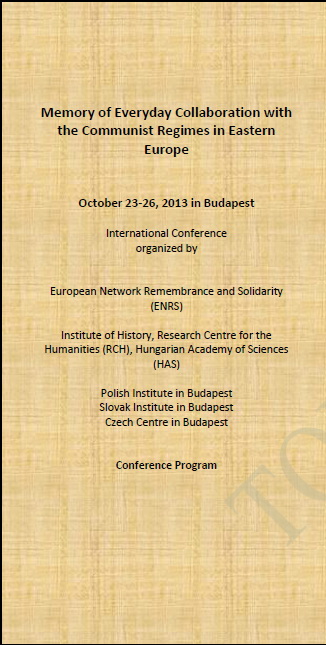 An international conference entitled "Memory of Everyday Collaboration with the Communist Regimes in Eastern Europe" will be organized by the Institute of History of the Research Centre for the Humanities (RCH), HAS and the European Network Remembrance and Solidarity (ENRS) between 23 and 26 October 2013 at the Institute of History (RCH, HAS) and the Polish Institute (1065 Budapest, Nagymező u. 15.).
An international conference entitled "Memory of Everyday Collaboration with the Communist Regimes in Eastern Europe" will be organized by the Institute of History of the Research Centre for the Humanities (RCH), HAS and the European Network Remembrance and Solidarity (ENRS) between 23 and 26 October 2013 at the Institute of History (RCH, HAS) and the Polish Institute (1065 Budapest, Nagymező u. 15.).
More information and the program of the conference can be read here.
One of the aims of this conference is to develop a new interpretation of ‘collaboration’ with the communist regimes by using terms such as ‘cooperation’ and ‘political participation’. The conference participants will seek to find new directions for a field that is often disrupted by the politically charged atmosphere in which stories of cooperation are revealed. It promises to reveal not only a wealth of ‘local’ and comparative information about cooperation hitherto unknown, but also seeks to interrogate the ways in which post-socialist cultures produce knowledge about ‘collaborators’ or ‘political participants’, and draw a distinction between ‘extraordinary’ and ‘ordinary’ histories. By intertwining the questions of knowledge production and the writing of the history of cooperation, the conference will yield methodologically sophisticated insights into how we construct such a past. The aim is also to better understand the often neglected national differences in East-Central Europe, instead of simply considering the Soviet bloc as a uniform entity.
The conference will focus on the micro-historical and the comparative, a combination that will offer in-depth understandings of the different ways in which the processes of cooperation played out in different socialist societies. These comparative everyday approaches have been carried out for Fascist and Nazi regimes, but not in a similarly systematic fashion for the communist ones, and a broader comparative history of the ways in which these regimes were experienced on the everyday level is still missing. The conference hopes to elicit papers that explore issues which focus on the everyday experiences of collaboration (e.g. socio-historical biographies of everyday secret agents and analyses of communities surrounding them).


